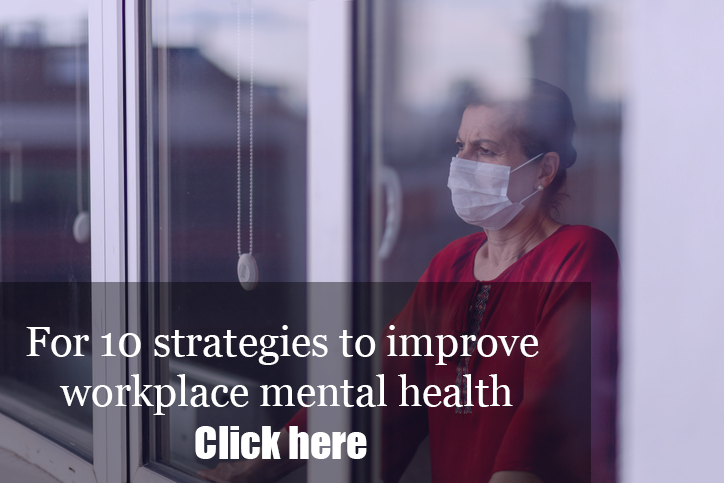It’s no surprise that, as a result of the COVID-19 pandemic, HR leaders are paying more attention than ever to the subject of mental health. And, with the nationwide protests over the murders of George Floyd, Breonna Taylor and others, there’s a growing recognition of how race and systemic racism can impact the overall mental health of people of color and, in turn, HR programs and policies.
More employers are stepping up and taking action to support their employees, particularly those in vulnerable communities, even while social distancing requirements continue to keep the workforce apart. In the latest findings from Morneau Shepell’s Mental Health Index™ , which provides a monthly measure of the mental health of American workers, key insights were uncovered about racial perceptions in the workforce across the United States. These findings are critical in helping provide a roadmap for HR leaders on how they can strategically develop effective and supportive mental health programs for employees of color.
A Disparity Between Perceptions of Racism in Society and at the Office
According to Morneau Shepell’s most recent index, 74% of American workers believe that racism remains a problem in the United States, while only 17% believe racism is a problem in their workplace. Non-white populations are significantly more likely to see racism in society and in the workplace.
Nine out of 10 individuals identifying as Black strongly agree or agree that racism is a problem in the U.S. society, followed by Arab/Middle Eastern/West Asian individuals (87%) and East Asian individuals (78%). In contrast, only 73% of those identifying as white strongly agree or agree that racism is a problem in the United States.
Related: HR’s mandate to model diversity and inclusion
Across the spectrum, views on racism in the workplace are rather different, with one-third of individuals identifying as Black strongly agreeing or agreeing that it is an issue, followed by 29% of South Asians and 29% of Southeast Asians. Of the individuals identifying as white, just 14 percent strongly agree or agree that racism is a problem in their workplace.
Despite these differences, there’s no denying the fact that, since the pandemic began, we’ve seen anxiety increase for most non-White individuals–especially in June, when the Black Lives Matter protests were kicking off in earnest. However, the scores improved slightly in July for all people of color, including those who identify as Black, East Asian, Latin/South/Central American, South Asian, Southeast Asian and mixed. This may be attributed to the growing awareness of systemic racism in society as a whole and the increased willingness to discuss these issues.
Different Perspectives on Systemic Racism
As the issue of systemic racism continues to rise in the national dialogue, the recent Mental Health Index™ reflects decidedly mixed perspectives. While 35% of all respondents feel that systemic racism is likely to decrease in American society as a result of heightened awareness related to the death of Floyd, 31% believe systemic racism is unlikely to decrease and 33% are unsure.
When discussing opinions of systemic racism in the workplace, only 24% of respondents feel that it is likely to decrease, 39% think that it is unlikely to decrease and 37% are unsure. In addition, 31% of respondents expressed their own awareness of system racism has increased over the past month, while 22% feel their thinking has not changed at all.
What HR Leaders Can Do Now
For HR leaders, the disparities regarding the perception of racism in society and the workplace show one of two things: the influence employers can have on creating a more level and equitable playing field for people from all backgrounds or willful denial as employees seek to avoid confronting the potential of racism in their workplace.
Either way, HR professionals are seeing an opportunity to more fully support their employees of color and are recognizing a greater need for additional mental health support, especially for those who identify as non-white. Here are some mental health insights to keep in mind when developing HR programs and policies:
- HR executives need to understand the impact certain events, such as the COVID-19 pandemic and systemic racism, have on various populations, particularly people of color. It’s critical for HR leaders to reach out to these workers to help identify specific programs designed to support and tend to the unique concerns that hurt employees’ mental health.
- Employers have a great opportunity to help reduce stigmas surrounding those seeking mental health support. Develop programs that increase the focus on improving wellbeing, including greater education about mental health and the resources available to employees, and how employees can identify warning signs, not only in their colleagues but in their personal lives as well.
- HR leaders and company executives should reexamine their benefit offerings to include mental health programs to better support employees during this stressful time, including counseling and employee assistance program services.
See also: Remote work, racism weighing on employees
The current Mental Health Index™ scores suggest a risk to the long-term wellbeing of employees, which may impact business productivity, health costs and disability absence. HR leaders have an extraordinary opportunity to support the mental health of their workers, particularly for people of color, not only in the workplace, but throughout all aspects of their lives.
The days of HR departments being focused on just physical health and traditional employee benefits have given way to a more holistic view of employee wellbeing. The current pandemic is serving as a catalyst for change as more companies incorporate mental health and overall employee wellbeing into HR programs throughout the American workforce.
To view the latest Mental Health Index™, click HERE.



